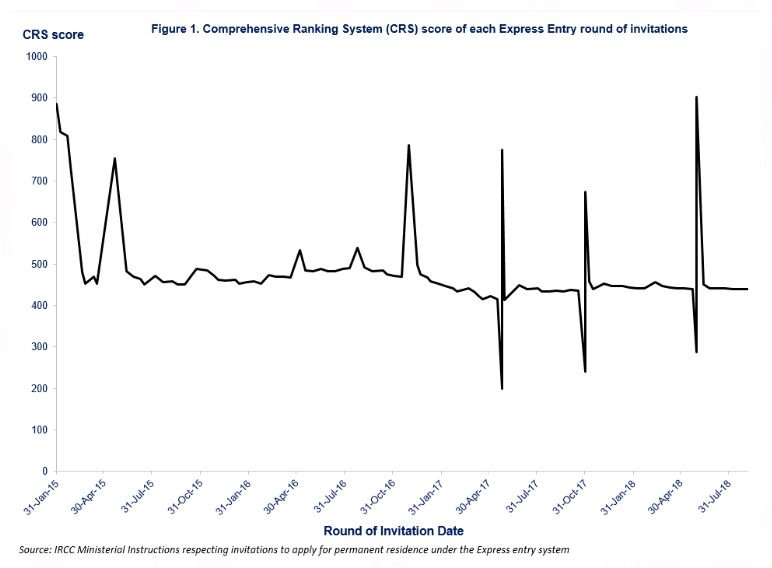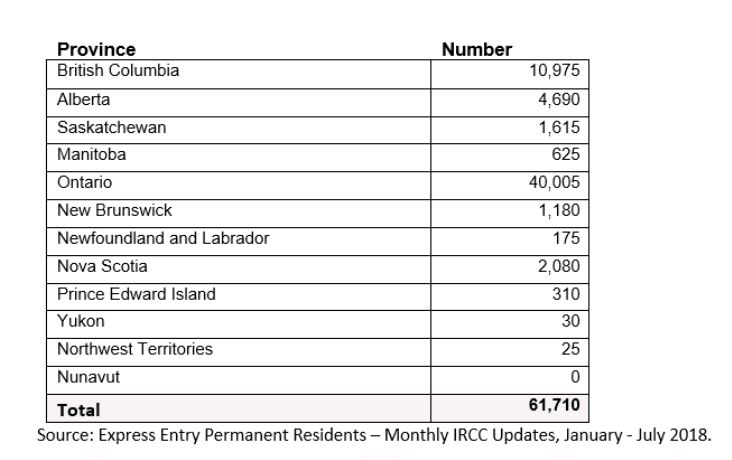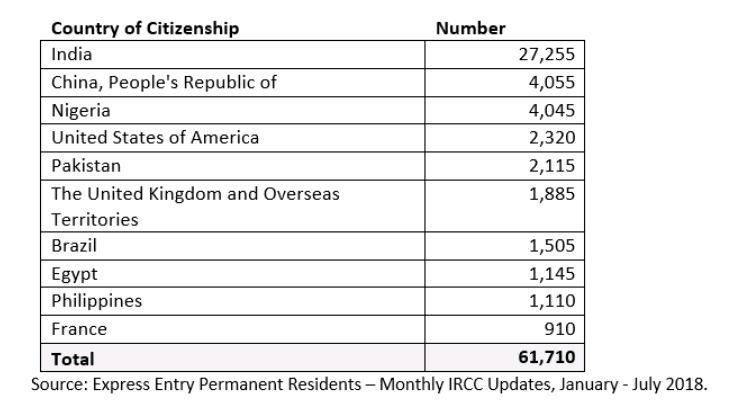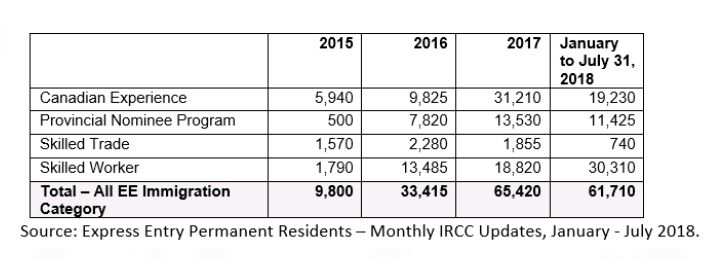Express Entry is Canada's immigration application management system which came into effect in January 2015. Express Entry manages the Canadian Experience Class, Federal Skilled Worker, Federal Skilled Trades Program and some Provincial Nominee Programs. The system is designed to select economic class immigrants who have the highest likelihood to become economically established in Canada.
Prospective applicants express interest in permanent residence by submitting a profile in the Express Entry pool. They are assigned a Comprehensive Ranking System (CRS) score based on age, education level, knowledge of an official language and work experience. Additional points may be awarded for Canadian education, having a Canadian sibling, a qualified offer of arranged employment or provincial nomination. Periodically, Immigration, Refugees and Citizenship Canada (IRCC) invites candidates with the highest scores to apply for permanent residence. If invited, candidates then have 60 days to submit a complete application. Once an application has been submitted, IRCC has communicated that it intends to finalize the application within 6 months.
Comprehensive Ranking System Scores

Figure 1 illustrates the CRS scores for each round of invitation. When Express Entry was initially implemented, the first invitations were issued to candidates who scored 886 or higher. The next several rounds continued to see high CRS scores. By March 2015, the scores dropped below 500 and have typically remained below this level, except for a few rounds and Provincial Nominee Program (PNP) specific rounds of invitations. Because a nomination certificate is worth 600 points, PNP rounds of invitations tend to reflect high CRS scores. The peaks on Figure 1 are from PNP specific draws.
Skilled Trades Program candidates tend to score lower CRS points due to their lower levels of education and lower language skills. IRCC has conducted program specific draws for the Federal Skilled Trades program to give these candidates an opportunity to apply. The valleys in Figure 1 reflect the program specific draws for this category of immigration.
Overall, the CRS scores have been hovering around 440-450 since 2017. The last general round of invitations on September 5, 2018, went to candidates who had Comprehensive Ranking System (CRS) scores of 440 or higher. Since the program was implemented, scores have ranged from a high of 886 to a low of 413.
The Composition of the Express Entry Pool
The Express Entry pool continually changes depending on the profile of candidates entering and leaving the pool at any given time. IRCC determines the number of invitations to issue in each round and only the highest ranked candidates are invited to apply. If there is a tie in the CRS score, the system will sort the tied candidates based on the date and time of the profile submission.
Figure 2 shows that the composition of the pool as of August 30, 2018, contained about 89,000 candidates. Among these candidates, about three quarters (66%) have current CRS scores of 400 or lower. Based on historical selection patterns, these candidates have a very low probability of being invited to apply as a Skilled Worker or in the Canadian Experience Class.
There were about 19,800 candidates in the pool with CRS scores of between 401 and 430. These candidates may have a chance at selection if invitations are extended to those whose CRS scores are below 440. The lowest CRS ranking ever in Express Entry went to candidates who had scores of 413 back in May 2017. From August to October 2017, candidates with scores in the 430s were invited to apply but CRS scores have not been below 440 so far in 2018. Though unlikely that they would receive an invitation to apply as a skilled worker or in the Canadian Experience Class, there may be an opportunity for a provincial nomination invitation if eligible.
There were about 1,500 candidates with CRS scores between 441-1200. These candidates are virtually guaranteed an invitation to apply given that IRCC has been issuing between 2750-3900 invitations in each round since January. This leaves about 1250-2400 remaining invitations to those who score below 441. There were more than 8,900 candidates in the 431-440 range. Therefore, unless IRCC drastically increases their numbers of invitations each round or there are fewer candidates in the high end, the CRS cut off is unlikely to go below 440.

Rounds of invitations between January and August 2018 have been given to between 2,750 and 3,750 candidates with the highest CRS scores. The latest round of invitations on September 5, 2018, went to 3,900 candidates, the highest number of invitations issued since April 2017. So far in 2018, 58,600 invitations have been extended. Once an invitation is extended, candidates have 60 days to submit their supporting documentation including identity documents, proof of education, proof of employment and work experience, language test reports, police checks and medical exams. Upon submission of a completed application, IRCC has communicated that it intends to process the permanent residence application within six months.

According to the Annual Report to Parliament on Immigration, IRCC's target is to land 74,900 new immigrants from the Express Entry system in 2018.[1] Preliminary estimates for 2018 show that about 61,710 new immigrants have been landed from the Express Entry system as of July 30, 2018.[2] In order for IRCC to meet the 2018 target, about 13,000 more new immigrants will have land by the end of the year. It must be noted that those who landed in 2018 as permanent residents were not necessarily invited to apply in 2018, but their applications were finalized, and they entered Canada as permanent residents sometime in 2018.
For the department to meet the 2018 target levels, we may see that in the remaining months of 2018, the number of invitations issued in each round will remain high. It may also mean decreased processing times as the department makes a year-end push to meet their landing targets.
Express Entry Admissions
The top three provinces of destination for newcomers who landed under the Express Entry system in 2018 were Ontario (65%), British Columbia (18%) and Alberta (8%).
Table 1. Express Entry applicants by intended province/territory in Canada, January to July 31, 2018

The top source countries for newcomers under the Express Entry system were India, China, Nigeria, the United States, and Pakistan.
Table 2 – Top Country of Citizenship of Express Entry applicants in Canada, January to July 31, 2018

About half (49%) of all Express Entry applicants who landed in by July 2018 were in the Skilled Worker category. The Canadian Experience Class landed just over 19,000 applicants between January and July 2018, representing 31%.
Table 3. Express Entry Category of admission, 2015 to July 31, 2018

There were about 11,400 Provincial Nominee applicants who landed so far in 2018. Provincial Nominee applicants represented the largest share of those who landed in Atlantic Canada. Among those who indicated Prince Edward Island, Nova Scotia or New Brunswick as their intended province of destination, 80% applied through the PNP program. This data demonstrates that provincial nominations may be effective in attracting permanent residents to smaller provinces.
Conclusion
The Express Entry numbers show that most individuals in the pool are unlikely to receive an invitation to apply. The system favours candidates that are young, have high levels of education, fluency English or French and possess Canadian work experience.
The cut off for invitations has remained steady at 440 and given the current composition of the pool, this cut off is unlikely to decrease. The number of invitations issues continues to rise and is likely to continue to rise as the department tries to meet their admission commitments.
Most newcomers were destined to Ontario and British Columbia with India being the number one source country for new permanent residents in 2018. The changing patterns of economic immigration mean that new immigrants may be better able to integrate and adapt to the Canadian labour market and establish themselves economically in the first few years of settlement. The demographic patterns are consistent with the growing diversity in Canada.
Footnotes
1 2017 Annual Report to Parliament on Immigration, Canada's Immigration Plan for 2018 to 2020.
2 Express Entry Permanent Residents – Monthly IRCC Updates, January – July 31, 2018.
Sign up for our e-Alerts
The content of this article is intended to provide a general guide to the subject matter. Specialist advice should be sought about your specific circumstances.

